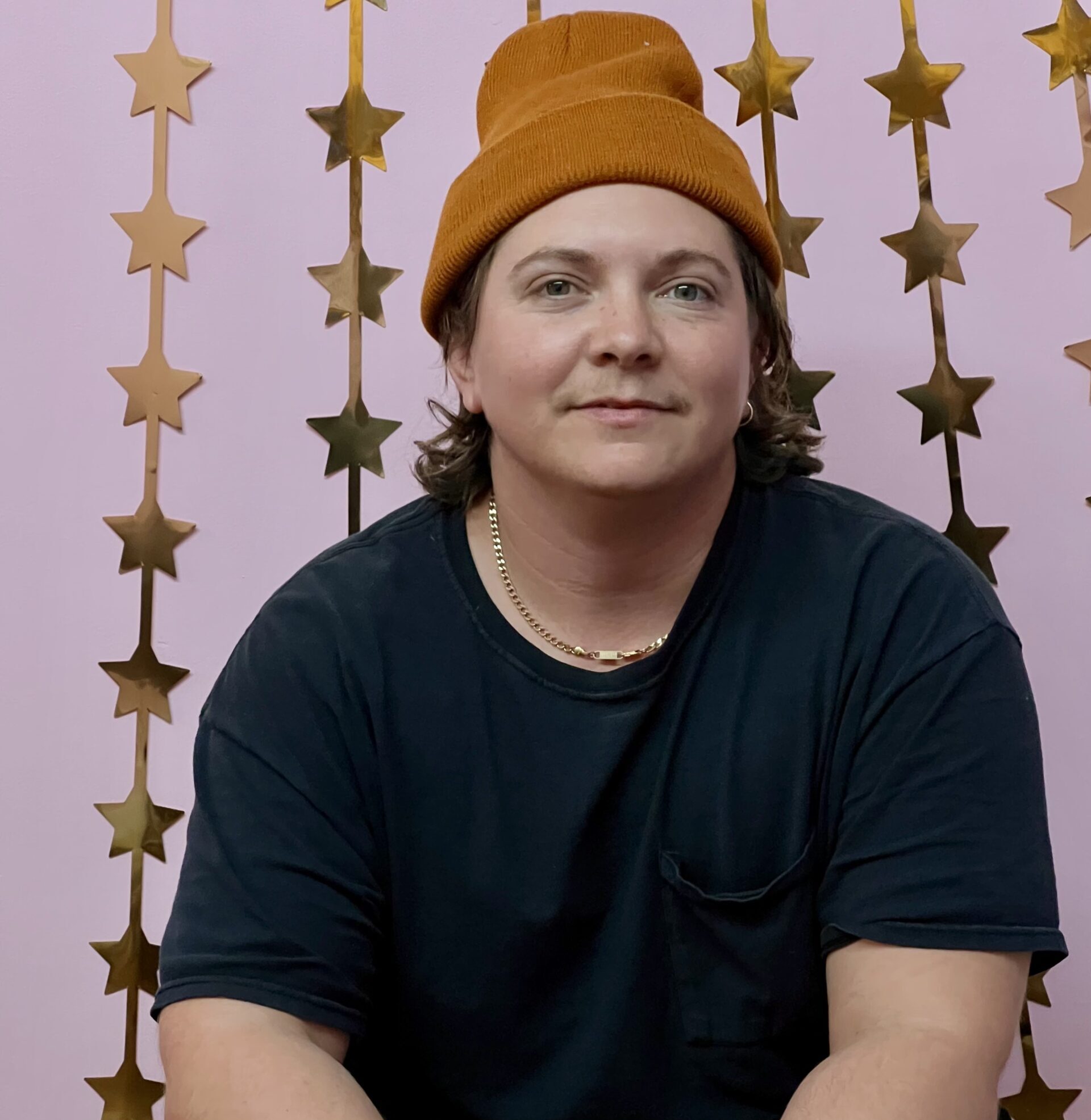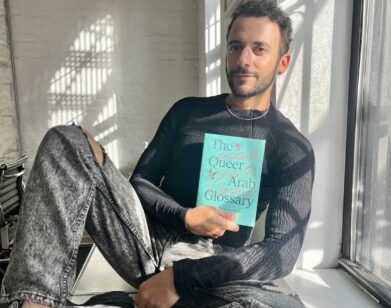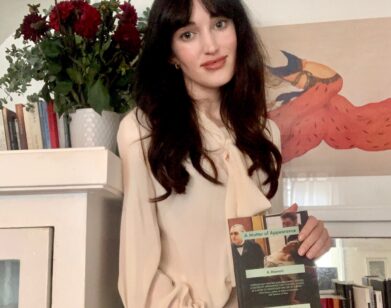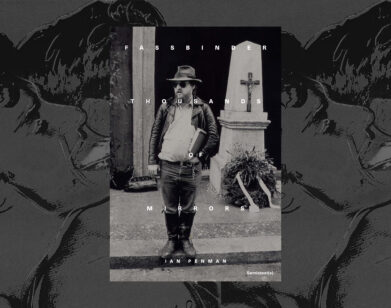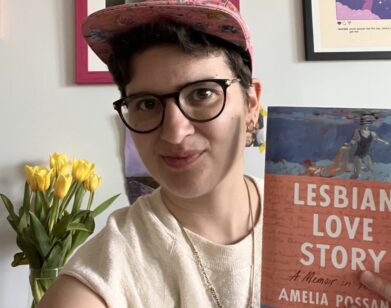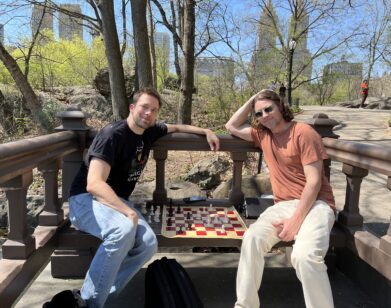WEATHER REPORT
Emerson Whitney Wants to Get Fucked by a Storm
Emerson Whitney’s new book, Daddy Boy, is all about submission, so it only felt appropriate that our conversation, conducted remotely via Zoom last week, was repeatedly interrupted by forces beyond our control. First, one of us would freeze, and then the other. A mic cut out. The audio garbled. After the first couple of mishaps, we started joking about how we had no other choice but to submit to our shared Daddy Zoom, thereby releasing ourselves to get fucked, so to speak, by whatever Big Teleconferencing would demand of us yet.
Whitney’s latest work of narrative nonfiction, the follow-up to 2020’s critically acclaimed Heaven, finds its author making similar concessions, sometimes by choice though more often not: his decade-long relationship based on dominance and submission comes to an end as he finds himself yearning to be Daddy himself. He works to rebuild his relationships with the brothers and adoptive father whom he hasn’t seen in years, interrogating his deep-seated need for not just their approval but the approval of men in general. In the wake of these events, hoping to find the very agency he finds lacking in his life—and driven by the memory of his earliest sexual experiences with strangers he met through storm-chasing forums online—he joins up with a ragtag team of thrill-seeking storm chasers unable to find a tornado no matter how hard they all try.
Shortly after the publication of Daddy Boy, we talked about all of that, along with Heaven, supermarket produce misters, our impending orca overlords, the rapturous beauty of a deep-sea whale fall, and more. But we began with something far more exciting, the hottest topic of smalltalk around. That’s right, you guessed it: the weather.
———
HARRON WALKER: Hey, Emerson.
EMERSON WHITNEY: Hi, how’s it going?
WALKER: I’m good. I’m sorry I kept you waiting for a minute.
WHITNEY: I’m just glad to be here with you, so fun.
WALKER: Diving right into Daddy Boy, there’s this one passage that I really liked where you’re talking about browsing this subreddit discussion about why we use gendered terms like “Father Sky” and “Mother Earth” to describe the Earth and the sky and the dynamics between them. And you find someone who has this very considered answer in the message board that’s like, “The sky seeds the Earth and the Earth grows things.” But your favorite response was, “because dads are distant, like the sky.” That got a couple chuckles out of me reading the book on the train. I was wondering, where are you right now and what’s the weather like?
WHITNEY: I am in Maine and it is so misty, and it’s been like this for apparently a month. So everything is very, very moist, it’s very wet in this spot. You know in the grocery store when they mist the vegetables? Do they still do that? That’s how it feels right now.
WALKER: They still do that. I can report that my local Ideal Food Basket still does. Is the mist normal for Maine?
WHITNEY: Not this time of year, I don’t think. I guess, what is normal? But it does feel like Jurassic Park in a way it hasn’t felt like in a long time. It’s misty, humid.
WALKER: Oh, shit. I don’t know if you’ve been back to New York at all lately, but changes in the climate are afoot, in a way that kind of feels like we’re just releasing ourselves to getting “fucked by a storm,” to paraphrase something you write in your book.
WHITNEY: Yeah, it does feel that way. It really does.
WALKER: Now we’re having smoke and smog from the distant forest fires. Are you getting any effects like that where you are?
WHITNEY: We are not, but I was just in Montreal and it was gnarly. I guess what I sometimes forget is how impactful that is day to day. Like right now, my whole household is just checking and checking the weather to see when the sun is going to happen again. I can’t remember the last time people that I live with or care about are super into checking it like I do. It does seem so interesting to reckon with the powerlessness of that. Like, there’s literally nothing we can do, and how cool that is.
WALKER: Yeah. I’m not religious at all, but after reading your book, and reading about the act of chasing after storms, it all makes me think of “Father Sky.” Like, “Okay, we can throw ourselves in front of as many hypothetical potential storms as we want, but we can’t make a storm happen. It’s just going to happen to us.” If there is a kind of deity controlling the weather, giving us whatever he, she, or they want to, then it feels like they’ve abandoned us.
WHITNEY: Totally. In some ways that is definitely what I was playing with in the book. Part of what I’m writing about is the internet moment where I was the only person in the house who knew what the internet was for a while. And I had a computer, I was making chat rooms. My first ever sexual experiences were meeting random dudes from tornado chat rooms in the world and going storm chasing. So there’s that whole version of storm chasing, which was super strange. But the version of storm chasing I did for the book was the tour one. We’re kind of buzzing about billionaire adventure tourism, and this was not billionaires. They were people from Essex, England paying $4,000 to sit in this van and they were essentially craving both the possibility of a cool photo and video but also this experience of rapture that the meteorologist is supposed to be getting us to. Which, for me, felt so similar to my experiences with domination and sex work. It just felt so on the nose that I couldn’t help but spend 100, 150 pages playing with those dynamics.
WALKER: I like how with this book, and your last book, Heaven, you give yourself as much space as you end up needing to disentangle whatever it is you’re trying to disentangle. In Heaven, I like that it wasn’t until maybe about a third of the way through the book that you finally zoom out from these very intimate snapshots of different pieces that you’re almost collecting on the Pinterest board of the mind. Thank you for making such a mess.
WHITNEY: Thank you for reading my mess. I appreciate it.
WALKER: Has writing always been that kind of process for you, of just throwing everything at the wall and seeing what the narrative coheres into?
WHITNEY: For sure, that has always been my craving. The first times I got an opportunity to do that was as a reporter for the New York Observer, and Peter Kaplan was the editor. I was working with a bunch of amazing folks. I was so young, like 21, 22. The first [story] I ever did was about a Playboy party, it was kind of cool but it wasn’t actually cool. I think the cool part was that Ice-T was there. Was it Ice Cube and Coco? Anyway, that was my first one.
WALKER: Ice-T, the guy from SVU.
WHITNEY: Yea! And Coco [Austin] is his wife, right?
WALKER: Yeah, Coco was having a huge media moment back then.
WHITNEY: That was my first ever story I did for them, and then they let me go on this ferry to Red Hook to go to Ikea. And the fact that they let me write about the ferry part and exploring Ikea, it felt like it was an opportunity to play with form from a journalist’s perspective. And it really set me off. I just wanted to keep doing exactly that. In some ways, this book feels like that. It just felt so good to get to connect different themes and ideas through looking at the external. Heaven, I think, was sort of the opposite. I was looking internally more, which led me to some external themes, where the external of this book led me to a bunch of internal themes. I really just like to accordion my work like that.
WALKER: When you were like, “I was given the time and resources to leave the office to go write about this thing in the real world,” I was like, “Cool!” I feel like that doesn’t exist as much in media anymore.
WHITNEY: Right, I agree. It felt like a very specific moment in time. And I was someone that had no background in anything. I was working as an assistant building manager at the time, which was super fun because my boss was an amazing butch trapeze artist. I was just reading Stone Butch Blues, hiding in the bathrooms, pretending to fix toilets.
WALKER: I’m thinking about what you said, with Daddy Boy, about looking at the external and letting that lead you towards the internal. Form wise, it feels appropriate and relevant to a lot of what you’re writing about: relating to male family members, and men, and aspects of masculinity, and how a lot of that is similar to storm chasing. It’s like releasing yourself from this idea that you can control another person’s actions, and all you can control is your own agency in the process.
WHITNEY: For sure. I think this whole book is circling around agency and this idea of mastery. Even right now, I am going to be distracted for the next 30 seconds by the fact that I didn’t remember which Ice it was that we were talking about. That kind of not knowing is really scary for me. I really struggle with when I make mistakes and when I don’t know stuff. Apparently I drove everyone nuts when I was little, lecturing my grandma about storms. But at the same time, I have always enjoyed the peace that can come from not having to know, and from finding that sort of surrender. And in some ways, the only real agency is in that recognition. Reading Heaven, it has a beginning, middle, and end, to me. When I talk about that book, I feel sure. I was a student of my mom. I know every inch of her face, what it means, everything. But with the dad stuff, I don’t actually know these people. I literally don’t know them. And I don’t even know so much about this particular book, and that feels extremely humbling.
WALKER: Is your writing process an act of surrender?
WHITNEY: Yeah, absolutely. I love that question so much that I don’t even need to expand. It’s just a pure yes. Because I think, truly… look, now I’m expanding, as I said I wouldn’t.
WALKER: I couldn’t possibly expand. Except for in these 17 ways.
WHITNEY: Exactly! I think there’s a piece to it that really tells me that it’s true.
WALKER: McKenzie Wark has a new book called Raving, I don’t know if you’ve read it.
WHITNEY: I haven’t read it yet.
WALKER: There’s something you write early on in the book about how the people in the van, maybe like yourself, all just wanted to get fucked by storms. It reminded me of something she wrote in her book about how the best ravers, in her estimation, are the ones who submit to getting fucked or penetrated by the music. And that there’s this sort of projected resentment, for cis straight men she sees on the dance floor who she feels are afraid to be penetrated. Are there any other activities that come to mind that are about fully submitting to yourself, like, “I’m going to get fucked by this thing,” so to speak.
WHITNEY: I think in some ways this book is hopeful, because I desperately want this straight white guy to find humanity and be whole. Wouldn’t it be amazing if straight white men were suddenly a force for good in the ways that I am always desperately needing them to be? It feels so strange to reckon with the fact that I have absolutely no optimism for that. But in writing this book, I was surprised by the folks that I was going storm chasing with. I thought they’d be those dudes who wear flying squirrel suits and jump off cliffs. I thought it was the submarine guys, essentially. I don’t know those guys and they might have been great. Who knows? But I found myself really loving these folks and being surprised by them. I was mixed up with straight folks and people that I really didn’t expect to connect with, and it made me feel little pinches of hope, that maybe there are folks that have a more significant analysis of systems of oppression and want to get down. But to your question about other times where there’s this desire to get fucked, I’m just obsessed with the current orca narrative. I want the killer whales to come. I want them here, at my doorstep. I want them to take over.
WALKER: The whole Titan submersible thing got me and so many other people down this Wikipedia rabbit hole of learning about the deep sea. I know I said I wasn’t religious before, but I recently had this religious moment after learning about whale falls. Do you know what a whale fall is?
WHITNEY: I’ve been seeing whale falls on TikTok, but I don’t know anything about them. Please tell me about whale fall TikTok.
WALKER: It’s really beautiful. It’s basically when a whale dies and falls to the floor of the deep sea. Basically everything down there feeds on what’s called marine snow, which I believe is just nutrients and debris floating, almost like underwater dust. So when you shine light on it, it looks like snow is floating around. A whale fall basically provides all at once the sustenance of two
thousand years of marine snow. There’s an immediate period for hagfish and eels where they’re just biting things off of it. And then there’s like 50 to 70 years where crabs and more scavenging types are finding more nutrients, and they continue to get nutrients that way for potentially hundreds of years, until there’s just no more whale left on the bottom of the sea floor. It’s really beautiful. It feels like there’s just this gift from above that you can’t control, ‘cause you’re just a crab.
WHITNEY: What was the part that felt spiritual to you about that?
WALKER: Well, the YouTube video I watched that explained it had stunning music that very much got me in the right mood. I think it’s just the idea that death can provide all this life. If you’re a little hagfish, you can’t tell a whale what to do. You just suck down dust from the sky until suddenly you’re in the right spot. I think it’s also the fact that it creates a mini ecosystem. Each whale almost becomes a tiny planet, in a way.
WHITNEY: It’s just so beautiful.
WALKER: I know. Thanks for getting it. Going back to your work for a second, do you have any idea what you might want to explain for yourself after Daddy Boy?
WHITNEY: I’m right in the thick of working on disability stuff. I’m starting to unpack diagnosis, testing, all of that stuff. In my life, diagnosis has been both really helpful and really harmful. I’m disabled, I use a wheelchair. And actually the book [Heaven] is centered around the fact that my mom passed away in August. She killed herself. We have all the same stuff, we both have Ehlers-Danlos [syndrome], and it was not possible for her to survive it. There has been nothing more humbling to me than her passing. It was the hardest, most intense thing that I’ve ever experienced. And I so desperately recognize that her life was unlivable in ways that my life also sometimes feels unlivable, but we were not both able to access that place of peace that is sometimes possible within a body under capitalism. She was making $17,000 a year cleaning peoples’ bedrooms in this very wealthy estate, so she couldn’t be disabled. I was told soon after her death that I’m the most of her that’s still here, basically, and that I get to wheel us toward joy if I can. I don’t know how much of that is true, and I have so many questions about what it means to be happy, what it means to be in a body. But I do wish for at least a reckoning with the ableism that is so intensely woven through my every day. And for the first time in my life I’m like, “I’m gonna come home to my body to try to live here.” ‘Cause I want to. I want to be here. So that’s what I’m working on.
WALKER: I’m excited to read it. What you just said reminds me of a similar thing. I just read an Annie Ernaux book, A Woman’s Story. It’s a biography of her mom, but when her mom dies she realizes that a part of her that has existed for the previous 40 to 50 years has died, too. It’s almost like the inverse of that. It’s interesting how we live on in other people and vice versa.
WHITNEY: Well, it’s the whale fall thing. I wrote about this in Heaven, but I feel like my mom has taught me everything through incredible sacrifice. And I don’t think she was even trying to teach me anything. I’m only alive because of this sustenance of her life. And it’s weird that she’s gone. I notice that I feel a bit uncapped.
WALKER: Speaking of Heaven, I really love how you reckon with your mother and also mothers more broadly at the end of that book. It’s like, “She’s just a person. They’re just people.” And I like this idea that there’s a way to find a kind of closure—or rebuild a relationship in the present—around an understanding that your mother is who she is.
WHITNEY: Even though she’s not in material reality anymore, I’m having the really cool experience of trying to feel cared for by whatever she is now. For months right after she died, I was trying to talk to her all day. I just desperately wanted her to haunt me. I was like, “Can you fucking haunt me? I’m ready. I’ve been ready for this forever. Come write on the mist of my shower mirror.” And she just didn’t haunt me. It was driving me nuts. I started to be like, “Maybe I’m supposed to feel it and not hear it or see it.” And it has been incredible, because I literally feel her. I think I can say this now, but she had a problem with stealing. I inherited a lot of craft items and I’m not sure where it’s all from. She didn’t have a lot of money. I have an entire room of intricate crafting things. So this room is really dedicated to my mom. And it’s been so weird to just try to feel it, rather than listen. She didn’t really have the capacity to write me a good note in her last moments, but it’s been life changing to be like, “Oh, I no longer have to wonder if I’m cared for.” And how weird to find that in her death.
WALKER: You’re just like, “I know that I am.”
WHITNEY: Yeah, I know that I am. For me, I want to know it, but I’m trying to learn how to feel it instead. I’m a Cancer—my birthday’s tomorrow—so I should be down for feelings.
WALKER: Any birthday plans?
WHITNEY: I am really excited to not do anything at all. Right now I live with my wife and my best friend. We just got e-scooters, so we’re probably gonna just ride our scoots.
WALKER: As an early birthday present, I will give you the gift of not having any more interview, then.

